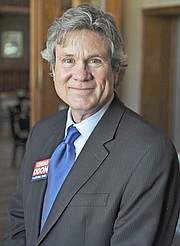FAYETTEVILLE — Diane Warren and Conrad Odom emerged from a five-way judicial primary, advancing to a runoff for a new circuit judge seat for Washington and Madison counties.
The state Legislature approved an additional circuit judge for the 4th Judicial District last year. The judge is expected to hear half the juvenile cases and some domestic relations cases. The new Division 8 judge will take office Jan. 1.
Elections in Arkansas for judges are nonpartisan. Circuit judges serve six-year terms and are paid $172,298 a year.
Odom, 54, has practiced law for 28 years and is a certified mediator.
Warren, 56, is a former attorney ad litem, a lawyer appointed by a court to act as an advocate for the best interests of a minor. She is chairwoman-elect of the Juvenile Justice and Child Welfare Section of the Arkansas Bar Association and has been selected to author an updated version of the Domestic Relations Handbook, a legal resource.
Warren got 10,741 votes (28%) while Odom received 8,944 (24%) of the votes cast in the May judicial election.
Warren said she would bring more juvenile court experience to the new seat.
“I am uniquely qualified for this because I have spent my career, over twenty years now, practicing juvenile and family law. I’m the only candidate in this race with significant family law experience,” she said. “I have experience dealing with all the issues that come up in juvenile court, and I will always make decisions that put the family first.”
Warren said she has represented children in foster care and has represented children and families in delinquency, custody, divorce, adoption and guardianship cases.
“I have visited foster homes, schools, detention centers and treatment facilities. I have talked to hundreds of children and walked with them on the journey through the juvenile court system.” she said. “I have been recognized by my peers for my work in the field.”
Odom said he has spent his career helping children and families in many different circumstances.
“This new judge position will serve vulnerable families and children, and that is exactly what inspires me to wake and work each day,” Odom said.
“For nearly 30 years, I have been using my law license to protect children. I work with many different kinds of children, including hundreds of children with disabilities. I help children who land in juvenile court because of shortsighted, bad decisions, too,” he said.
Odom said he’s also helped injured mothers and fathers navigate a complicated workers’ compensation system so they can pay their bills as they recover. He supports public education because he believes a teacher’s job is the most important in society.
Both candidates agreed juvenile court is different from adult courts. There are more options available to a juvenile judge because the primary goal is redirecting youth and families.
“This provides a unique opportunity to tailor rehabilitation efforts for each unique circumstance. Not all family problems are the same and not all juvenile issues are the same,” Odom said. “Therefore, we shouldn’t treat all rehabilitation efforts the same.”
Warren said she wants to use that flexibility to help make families whole again.
“The goal is to intervene so young people don’t wind up in prison as adults and families can be together,” Warren said. “Every decision I make as judge would be aimed at helping families remain together when possible, and, when that’s not safe, to find supportive placements for the children. And, to help the young people who come before me become productive members of society.”
Warren said she wants the job because she wants to make the system of juvenile justice, child welfare and family law better for families who find themselves in court.
“This also impacts people beyond the court’s walls. If the court works well, it makes our community safer and healthier,” she said.
Warren said circumstances led her to begin representing children.
“I grew to love the work and the children I served, and the juvenile court system has become my passion,” Warren said.
Odom said he wants the job because he thinks, as a community, the region can do better by its children.
“My heart is for reforming lives. My past experience working for hundreds of disabled and disadvantaged children is perfectly tailored for this position,” Odom said. “My volunteer time is devoted to Scouting, the Boys and Girls Club, the Fayetteville Public School Board and the Fayetteville Education Foundation. I will use my experience with these amazing institutions to help our juvenile offenders.”
Odom said as a Scoutmaster he has seen first hand how youth can learn self-confidence and self-reliance in a merit-based program. He would work to connect good people and programs to vulnerable juvenile offenders to help instill character, responsibility and leadership skills, he said.
Warren said each person who works in the juvenile system has a specific role and the court works best when it expects each person to do their job and holds them accountable.
“I will set time-specific hearings, clearly identify the issues that will be addressed and be prepared to address the matter at hand,” Warren said. “I will work to develop diversion programs to reduce the number of cases that must be tried, and I will encourage lawyers and families to work together where possible so court time is reserved for dealing with remaining matters that cannot be resolved.”
Warren said she would consider diversion programs that could include restorative justice for victims, teen courts and warn-and-release programs that allow youths an opportunity to avoid prosecution if they improve their behavior and participate in counseling or community service programs.
“And I would work in partnership with schools, mental health agencies, children’s advocates and state agencies through the Juvenile Detention Alternatives Initiative to develop additional programs that give families a chance to get back on track before rendering judgment,” Warren said.
Odom said juvenile court is at maximum capacity, so the addition of another judge is certain to increase judicial efficiency. He’s organized and efficient in his law practice and expects that will translate to having a fast-moving docket, he said.
“Diversion courts such as drug court and veterans court are popular because our judiciary is fast realizing crime is the logical product of cyclic family violence, drug abuse, lack of access to education and inadequate intervention,” Odom said. “Juvenile court was designed by legislators to be very broad. A juvenile judge has the unique ability to impact not only children’s lives, but the lives of sisters, brothers, parents, grandparents and other relatives.”
Warren said as judge she’d work with schools, social services, health providers and other resources and set clear expectations and provide the necessary means for families to get back on track.
“Every case that comes before the juvenile court represents a family in crisis,” she said. “Outcomes can be improved by engaging the family in the process of figuring out where things went wrong, identifying what supports are available to the family, locating services available to give the family members the tools they need to rectify the problem and holding them accountable for doing so.”
Odom said as juvenile judge he would set achievable goals to foster a culture of positivity and self-respect.
“We must stop our pipeline to prison, which is both a mindset and a consequence for treating children like adult criminals. This is our last clear chance to make a lifestyle change that will last a lifetime,” Odom said. “I will hold children and their parents accountable for their actions, but I will do so in a positive way that gives them the tools for rehabilitation to avoid our system and becoming a sad statistic of an eventual adult inmate.”
Odom said he’d use rehabilitation programs, educational programs and drug treatment programs, and he’s also an advocate of vocational training.
“I believe in the future of our community’s children. We must offer them the ability to learn about nursing, health care work, welding, plumbing, electrical, prelaw, premedical, computer programming and many other professions on which our country was built. It is unrealistic to expect success if we don’t show them how to make an honest living or understand the value of education.”
Odom said he has practiced in a wide variety of courts all over the state, but has found working with at-risk youth and those that have physical, mental or intellectual challenges to be most rewarding.
“I know first-hand there are too many families and children here in Washington and Madison counties that face overwhelming challenges. The cards are stacked against them. I have seen and worked with those families in both my professional and personal life,” he said.
“One answer does not solve those problems. One must think outside of the box to provide a unique solution to help the lives of struggling children and families,” he said.
Odom said he has served the community by serving as a decision maker on many boards and commissions and that has have given him the compassion and problem-solving abilities required of a good juvenile judge.
Warren said practicing in the juvenile court system has prepared her to be a judge in that court.
“For the last twenty years, I have practiced in the juvenile court. I have been in the foster homes,” Warren said. “I have had the joy of letting a child know they will be able to go home, and I’ve felt the pain of telling a child that they won’t ever see their parent again. I have raised my own children, which provides experience with the struggles all parents face.”
Five candidates were vying for the seat in May; the other three were Mieka Hatcher, Brian Hogue and Tim Snively. All are Fayetteville residents. Snively had 7,609 votes (20%), Hogue 5,373 (14%), and Hatcher 5,108 (14%).
The election is Nov. 3. Early voting starts Oct. 19. A voter may request an absentee ballot application by contacting the county clerk in the county where the voter is registered, according to the Arkansas Secretary of State website. Voters may download the application from the county websites.
Conrad Odom
• Age: 54
• Residency: Lifelong resident of Fayetteville
• Employment: Lawyer, Odom Law Firm
• Education: Law degree, University of Arkansas
• Political Experience: Elected to Fayetteville City Council in 1992; appointed to Fayetteville School Board in 2008; appointed to City Council in 2004
Diane Warren
• Age: 56
• Residency: Lived in Fayetteville for 22 years
• Employment: Lawyer, The Warren Firm since 2012
• Education: Law degree, Indiana University, Bloomington, Ind.
• Political Experience: None


